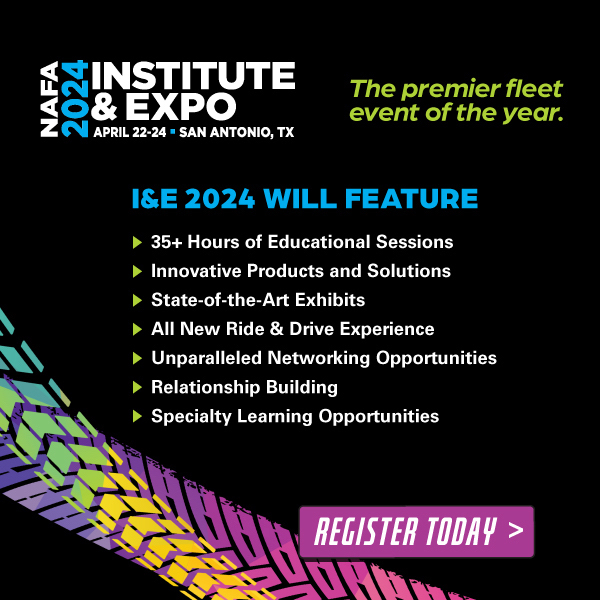
By Ed Pierce, Contributing Editor
Editor’s Note: In July, Element Fleet Management Corp. reported solid second-quarter and first-half results, including second quarter and first half net revenues. growth in service revenue and strong cash flow. Fleet Management Weekly caught up with David Madrigal, Executive Vice President and Chief Commercial Officer for the U.S. and Canada, to learn more about the company’s progress.
Element’s David Madrigal is excited about the fleet market in this era of the ‘new normal.’ The Executive Vice President and Chief Commercial Officer believes his company’s investments in recent years directed at strengthening technology, financials, and processes, have permitted the company to deliver a superior client experience at time when fleet managers need a strong partner.
“Fleet managers today face two-levels of concern. Core, everyday fleet problems like how do they increase productivity? How do they mitigate risks? How do they reduce carbon footprint? And now, they need to layer on top of those challenges the new reality of EV conversion, supply chain disruption, more predictive data, remote worker-caused fleet rightsizing, and more,” says David.
“We made a conscious decision several years ago to prioritize internal transformation rather than growth because we really wanted to be ready for rapidly changing fleet needs,” explains David. “The pandemic certainly sped up change in many unforeseen ways for fleets. Fortunately, Element is in an excellent position to help our customers through the turbulent times. We feel ready and confident that we can offer the industry’s best platform and the best service out there.”
Today’s Challenges Require a Strong Fleet Partner
Fleet managers want a strong fleet partner with the resources to provide tailored solutions and services with both deep and broad expertise. “Today’s fleets have become more complex, the assets are more complex,” David observes. “I think this last year we’ve seen many clients having to deal with difficult challenges, for example, decarbonizing the fleet. How do they compare and convert the alternatives? That’s not an easy task to tackle without specialized expertise. That’s where Element comes in! We make the complex simple for our clients.”
David noted that a fleet management company’s ability to help its customers deal with an industry-wide problem like the shortage of replacement vehicles is to share its experts’ insight into the situation, research into the alternative remedies, and have a strong knowledge of the client.
“Providing constant and timely information for our clients is critical,” he says. “The environment is changing rapidly with different interpretations on a daily basis. Helping our clients stay on top of how the market is evolving and how the news is going to impact them is an important first step.
“We can advise a client to order a particular type of vehicle. We can forewarn a client about vehicles that are not going to be produced in the coming quarter. We will then recommend alternatives based on usage and shift orders to available vehicles or defer replacement. The combination of aggregating the information that we receive from the OEM and the translation of its impact ensures actionable information for our clients.”
Investing in Predictive Analytics
David notes that as the quickening rate of change clouds the view of what’s ahead, Element clients don’t want to rely solely on traditional historical data for planning. “We have invested heavily in predictive analytics, adding processing power, increasing benchmarking capability, and taking full advantage of the diversity of our portfolio. This truly sets our data analytics team apart in terms of the intelligence that we can provide to our clients.”
 Global Presence Bring Cross Pollination of Ideas
Global Presence Bring Cross Pollination of Ideas
Element’s global presence, knowledge and consulting add a whole new dimension to building solutions for today’s fleet issues. “We have over 25 years of partnership with Arval, plus direct operations that take us to over 53 countries,” says David. “We adapt to what each market wants in terms of value proposition, processes, and product offerings.”
“We understand that we must help our clients understand and work within the bounds of each country’s cultural, financial, taxation, privacy, and OEM idiosyncrasies. The same adaptability is necessary in dealing with vehicle model shortages, EV transitioning, green initiatives, and more.”
David points out that Element global fleet awareness means its clients benefit from the cross-pollination of ideas, innovations, and lessons learned from other regions and countries. He cites the example of electric vehicles: “The EV journey for our business in Australia-New Zealand started probably three or four years ago. They are well ahead of where we are today in North America so our clients in the U.S., Canada or Mexico are going to jump start their programs based on what we learned in ANZ. Our global scale gives us that ‘best practice’ sharing advantage that results in better services in each one of the countries that we serve.”
Helping Clients Transition to EVs
“Element is leading the charge into the realm of electric vehicles to help our clients navigate uncharted territory,” says David. “We put together a dedicated EV team with skills across electrical engineering, data analytics, sustainability, and strategic relationship development that can leverage the expertise that we have from ANZ and our colleagues at Arval – we’ve built an agile, end-to-end EV ecosystem.”
David describes the all-inclusive effort this way: “We are partnering with charging station specialists, weighing the options for charging cards, detailing the entire EV infrastructure and ecosystem, and sharing ‘best practices’ in the management of EVs with our clients.”
 Mobility Comes to North America
Mobility Comes to North America
Similar to the EV experience, mobility is another industry trend that has come to the fore in Europe over the past decade. David recounts the difference between going to conferences in Europe versus going to a conference in North America: “When a conference took place in the US, it was centered around optimization of fleet or total cost of ownership. At the European conference, they were talking about mobility. Today, we are talking about autonomous vehicles in the U.S. and not really talking about mobility, but at some point, we’re going to start talking about mobility in North America.
Based on his own global experience, David recognizes regional differences noting that what happens in Germany or in France is not going to make sense in Missouri. “We need to understand even just the geography and the size of the US compared to some countries in Europe,” he explains.
“As we come out of this pandemic, and as CO2 reduction becomes a priority, mobility will become another option in the fleet manager’s tool kit in locations where it makes sense. Providing a budget for transportation instead of the automatic presumption of a company vehicle may encourage the use of alternative transportation in certain metropolitan areas. Realistically, however, if you live in Houston and they give you a mobility budget, there’s no alternative to using your car. Finally, the connection between European fleet vehicles to compensation versus the preponderance of North American vehicles that are tied to the job affects the likelihood of adopting mobility solutions.”
Leveraging Strengths to Serve the Client
While David is enthused about Element’s position today, he believes that tomorrow looks even brighter. “We have unparalleled depth of expertise with an industry leading team of data analysts, and strategic consulting specialists.
“The scale of being the largest fleet management company in North America and other markets makes us formidable, and our global alliance with Arval ensures seamless integration of solutions for multi-national fleets. So, what gives our clients confidence in Element as a partner today – the combination of people, scale and portfolio will continue to define a consistent, superior client experience into the future.”



